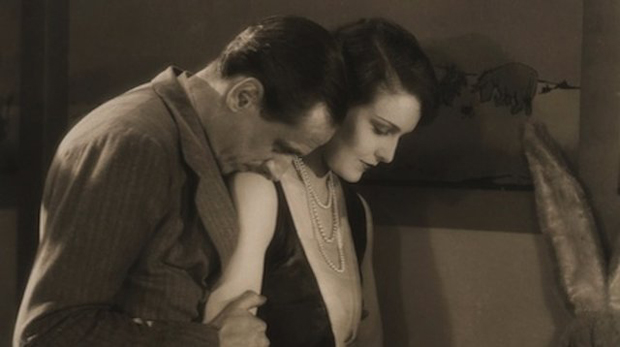Click here to view the trailer.
Showing @ Filmhouse, Edinburgh, Fri 11 May only
Miles Mander / UK/ 1928 / 88 min / Silent
Despite ten years having been spent by the BFI lovingly restoring this 1928 British silent movie, it’s difficult to make the case for The First Born being a classic. That said, it’s certainly an interesting artefact from a forgotten era, full of fascinating insights for modern viewers into its time, culture and the last great days of silent British filmmaking.
One of the primary reasons for its restoration is its Hitchcock connection. The First Born is scripted in part by Alma Reville – Hitch’s wife and collaborator; and although directed by star Miles Mander from his own play, there are certainly one or two singular visual experiments that tempt you into thinking that the master may have lent a hand. Outside of these few moments however, this is an enjoyable, overwrought melodrama, full of infidelity and desperate love – exactly the sort of entertainment typical of stage and screen between the wars.
Philandering husbands, suave lovers, devoted wives, illegitimate children and exotic locales. The First Born is a frothy concoction with its stage roots very much on display, but its open sensuality including brief moments of nudity. Its use of intercutting, fades and symbolism are such a contrast to the stiff upper-lipped nature of the early sound films which were to follow, that the most startling thing about this picture is the realisation that just as filmmakers were finally mastering the visual language of the screen they were silenced by sound.
As a piece of filmic history, The First Born is quite marvellous. Beyond the Hitchcockian possibilities and the technical aspects, there’s the opportunity to see Madeleine Carroll, famous as the first of Hitch’s ice blondes (unrecognisable as a slightly chubby brunette and Mander, later to become a fine character actor in Hollywood, in rakish form as Sir Hugo). It’s also a chance to enter a bygone age of class, hierarchy, manners and deference – the time of bright young things before the clouds of war rolled back over Europe. It’s like watching a P.G. Wodehouse adaptation without the laughs.
The real highlight of this show is the live music composed and performed by Stephen Horne. This isn’t simply accompaniment but genuinely sympathetic musical scoring that never intrudes but astutely underpins the frequent changes of emotion. There are certainly better silent films you can see, but its mix of historical interest and the artistic culmination of the first golden age of movie making – not to mention the possibility that some of what you’re seeing might be from the mind of the one of the greatest filmmakers of all time make it more than a mere curiosity.


Comments